A core tenet of American democracy is the right to a fair trial. An entire justice system has been built around upholding the law of the land, prosecuting the guilty and exonerating the innocent — at least, in theory. The truth is actually a lot more complex.
Here we’ve selected five books exploring this complexity and the points at which the justice system breaks down, each from a different perspective in the courtroom — the defense, the prosecution, the defendant, the witness and the juror. Each examines how various elements of the system can contribute to an unjust result, sometimes through machinations and deceit, sometimes despite a strong case and the best intentions.
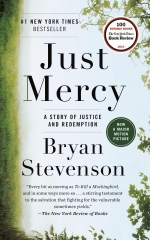
Just Mercy: A Story of Justice and Redemption by Bryan Stevenson
Just Mercy: A Story of Justice and Redemption by Bryan Stevenson
Bryan Stevenson was just a young, idealistic defense lawyer when he met Walter McMillian, a Black man convicted and sentenced to death row for the murder of a young white woman in a small town in the Deep South — a murder he insisted he did not commit. Now a feature film starring Michael B. Jordan and Jamie Foxx, Just Mercy uncovers the nexus of conspiracy, politics and dirty prosecution tricks that led to an innocent man being painted as a murderer, despite the lack of evidence.
Eventually, Stevenson was able to win McMillan’s release, but the case would forever change his perspective on the concepts of mercy and justice. It’s an eye-opening story that demonstrates how, as one lawyer puts it, capital punishment means people without capital — i.e., money — get punished. Of the many accolades this book has garnered, CNN called it one of the most influential books of the decade. One can only hope. (Watch Stevenson’s moving 2012 TED Talk here.)
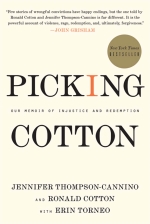
Picking Cotton: Our Memoir of Injustice and Redemption by Jennifer Thompson-Cannino and Ronald Cotton
Picking Cotton: Our Memoir of Injustice and Redemption by Jennifer Thompson-Cannino and Ronald Cotton
In 1984, Jennifer Thompson was a college student living off-campus when an assailant broke into her apartment during the night and raped her at knifepoint. She recalls that her mind switched into a kind of survival mode, and she consciously strove to memorize everything about her rapist’s appearance so that she could identify him to police … should she survive the attack. Police sketches, mug shots and a line-up later, she had confidently identified the perpetrator: Ronald Cotton, who was then tried and convicted for the crime.
This would be a satisfying tale of justice for the victim but for one important fact — Cotton didn’t do it. In 1995, when DNA testing became available, Cotton’s results revealed the truth, as well as the real perpetrator — a man Jennifer says she had never seen before. More than an example of faulty eyewitness testimony, Picking Cotton is the story of an unlikely friendship, of atonement and forgiveness, and of turning tragedy into the impetus for social change.
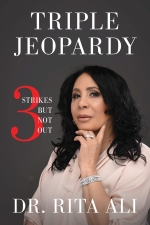
Triple Jeopardy: Three Strikes But Not Out by Dr. Rita Ali
Triple Jeopardy: Three Strikes But Not Out by Dr. Rita Ali
Philadelphian socialite Dr. Rita Ali ran with celebrities, enjoyed the high life as a radio personality and beauty consultant, and had earned the respect and admiration of her community. So, how did she end up tried, convicted and imprisoned three times for essentially the same crime?
Allegedly, she had funneled thousands of dollars in public funds through a partnership between Sister Clara Muhammad School and the Community College of Philadelphia, a supposed scheme to profit off of promised, but fake, adult education classes. And despite the fact that federal undercover agents’ secret surveillance of the school found that the program did indeed exist and classes were held, Dr. Ali was found guilty. But why?
Ali boldly tells her side of the story, and in doing so she investigates the pertinent issues that impede justice not just for her but for thousands of the wrongly accused, including politically motivated agendas, media distortion, Islamophobia and racism. (Learn more about this book in our review and interview with the author.)
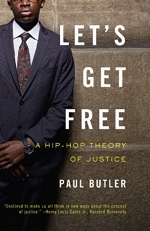
Let's Get Free: A Hip-Hop Theory of Justice by Paul Butler
Let’s Get Free: A Hip-Hop Theory of Justice by Paul Butler
Paul Butler was a Harvard Law grad and an ambitious federal prosecutor in an elite Department of Justice unit. That is, until one day he was arrested and charged with a misdemeanor he didn’t commit. This experience, including his own trial, opened his eyes to the way the justice system really works — one in which he had himself been complicit. Part memoir, part manifesto, Let’s Get Free offers a unique perspective, coming as it does from both sides of the courtroom aisle and from a Black man raised on the South Side of Chicago coming full circle in a crisis of conscience.
Along the way, Butler examines what “doing the right thing” means in a corrupt system, the racist underpinnings of policing and law, and how ordinary citizens can take back their agency in the face of a legal system designed to keep social control to the benefit of those in power. It’s also an examination of how “fighting the good fight” as a prosecutor becomes a slippery slope: “In addition to the violent creeps I put away, I sent hundreds of other people to prison who should not be there,” admits Butler.
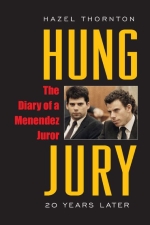
Hung Jury: The Diary of a Menendez Juror, 20 Years Later by Hazel Thornton
Hung Jury: The Diary of a Menendez Juror, 20 Years Later by Hazel Thornton
A jury of one’s peers is a core component of the U.S. justice system, designed to produce a more fair judgment. But juries can also be manipulated psychologically and strong-armed legally into leaning toward guilt or innocence. Former juror Hazel Thornton takes us behind the scenes at the first trial of Lyle and Erik Menendez, a seven-month tabloid feeding frenzy that ended with two deadlocked juries.
The brothers were eventually convicted of murdering their wealthy parents, but with the help of psychological commentary by Lawrence S. Wrightsman and Amy J. Posey, along with legal commentary by Alan Scheflin, Thornton’s memoir lays out how the defense employed a “blame the victim” strategy and how, contrary to popular belief, Erik’s jury, in fact, hung not on the issue of guilt, but on the charge. While the book ultimately rests in defense of America’s jury system, it gives much food for thought in how justice can go off the rails in jury trials.




